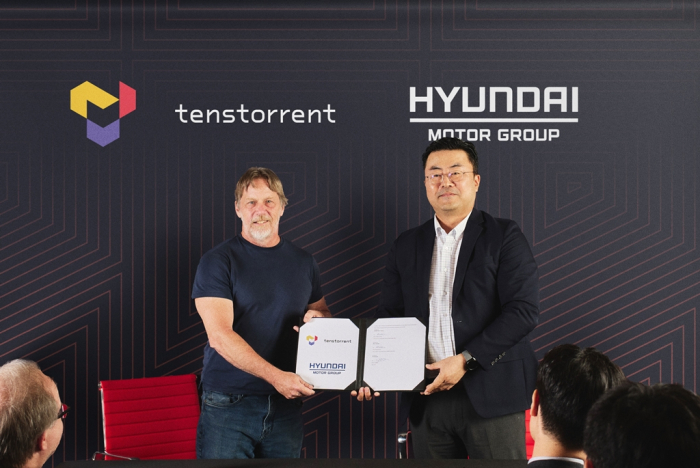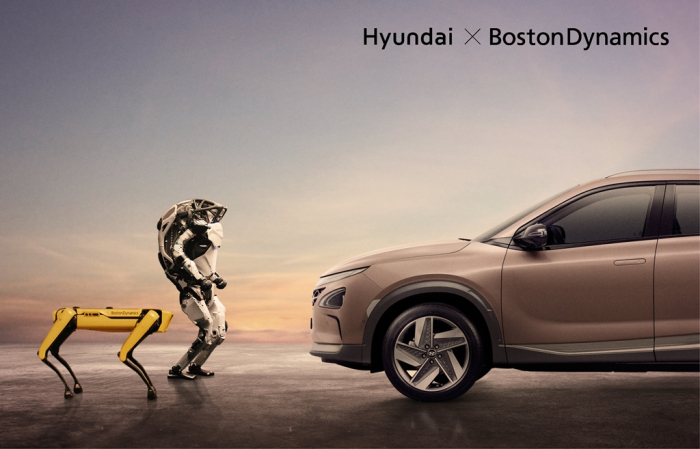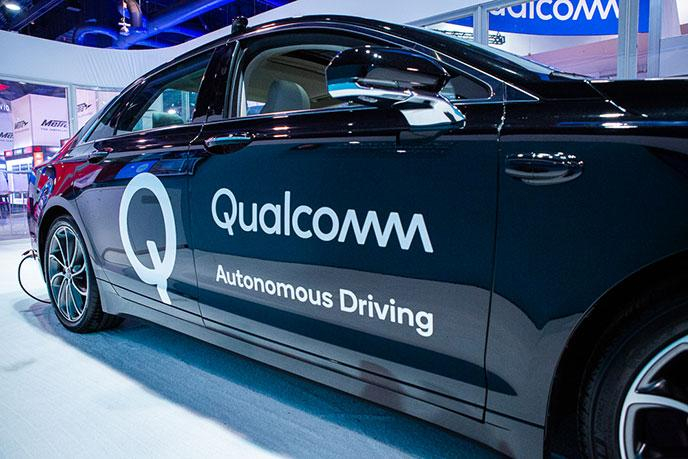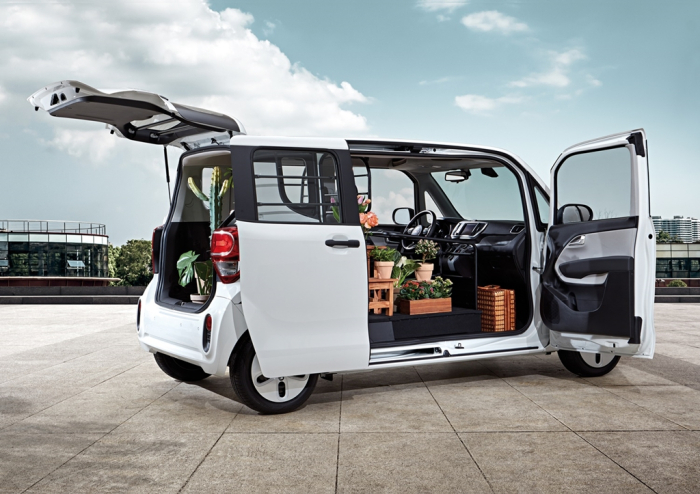Future mobility
Hyundai, legendary chip architect Jim Keller to make chips for future cars
In a strengthened tie-up with chipmakers, Hyundai also said it’s using Qualcomm’s Snapdragon chip for PBVs
By Aug 03, 2023 (Gmt+09:00)
4
Min read
Most Read
LG Chem to sell water filter business to Glenwood PE for $692 million


KT&G eyes overseas M&A after rejecting activist fund's offer


Kyobo Life poised to buy Japan’s SBI Group-owned savings bank


StockX in merger talks with Naver’s online reseller Kream


Meritz backs half of ex-manager’s $210 mn hedge fund



South Korea’s top automaker Hyundai Motor Group said on Thursday it has partnered with legendary chip architect Jim Keller to jointly develop next-generation chips for future mobility vehicles and robots.
As part of their partnership, the Korean automotive group’s two car-making units – Hyundai Motor Co. and Kia Corp. – have purchased a stake in Keller’s AI chip startup, Tenstorrent Inc., with a combined $50 million investment.
The investment – $30 million from Hyundai Motor and $20 million from Kia – is part of Tenstorrent’s $100 million funding round. The Toronto-based startup developing artificial intelligence chips has raised the remaining $50 million from Samsung Catalyst Fund and other venture capitalists, including Fidelity Ventures, Eclipse Ventures, Epiq Capital and Maverick Capital.
Samsung Catalyst Fund is a green multi-stage fund run by Samsung Electronics Co. that invests in deep-tech infrastructure and data-enabled platforms.
“Tenstorrent’s high growth potential and high-performance AI semiconductors will help Hyundai secure competitive technologies for future mobility vehicles,” said Kim Heung-soo, executive vice president and head of the Global Strategy Office at Hyundai Motor Group.
“With this investment, the group expects to develop optimized but differentiated semiconductor technology that will aid future mobility projects and strengthen internal capabilities in AI tech development.”

LEGENDARY CHIP ARCHITECT
Established in 2016, Tenstorrent specializes in designing and developing advanced processors for AI and machine learning (ML) workloads.
The company is one of several startups looking to challenge Nvidia Corp., the market leader in supplying chips to develop AI products such as ChatGPT.
With US offices in Austin, Texas and Silicon Valley, and global offices in Belgrade, Tokyo and Bangalore, the AI chip startup has expertise in computer architecture, ASIC design and neural network compilers.
Keller, its chief executive, is a prominent computing chip architect, who previously worked at Intel Corp. and Advanced Micro Devices (AMD) Inc.
He has been a key player in chip advances at multiple companies. He also worked on some of Apple Inc.’s early proprietary processors.

At Tesla Inc., he helped the electric vehicle giant design a chip at the heart of its autonomous driving computing system.
“It has been impressive watching Hyundai Motor Group become the third largest automaker in the world through their aggressive adoption of technology including their acquisition of Boston Dynamics, their joint venture with Aptiv, and now their investment in us,” said the Tenstorrent CEO.
For Tesla veteran Keller, Tenstorrent’s partnership with Hyundai marks a return to car technology.
CHIPS FOR FUTURE MOBILITY, ROBOTICS
For Hyundai, the partnership means the integration of AI tech into future cars made by Hyundai, Kia and premium brand Genesis as well as robotics and advanced air mobility (AAM) vehicles.
Under their partnership, Tenstorrent and Hyundai will develop high-performance chips for central processing units (CPUs) and neural processing units (NPUs) used in future vehicles.
Tenstorrent makes its own AI chips but also sells its intellectual property and other technology to customers looking to make their own AI chips.

Earlier this year, Hyundai Motor Group established a semiconductor development division to strengthen its automotive chip development capabilities and handle collaboration with its partners.
Industry officials said Samsung Electronics, the world’s top memory chipmaker, has also sought to work with Keller.
In November 2021, the chip designer participated in the Samsung Advanced Foundry Ecosystem (SAFE) Forum, its annual foundry seminar, to give a speech and discuss AI chips with Samsung executives.
In May, Tenstorrent announced cooperation on AI chip development with LG Electronics Inc.
HYUNDAI, QUALCOMM TIE-UP ON PBV INFOTAINMENT
Hyundai has collaborated with several global chipmakers, including Samsung, to advance its future mobility technologies.

On Thursday, Qualcomm Technologies Inc. said it is supplying its Snapdragon Automotive Cockpit Platforms to Hyundai Motor Group for use in infotainment systems for purpose-built vehicles (PBVs).
Hyundai has been developing PBVs as it seeks to morph into a future mobility provider.
The market for personalized vehicles has huge growth potential as such cars can be used for a variety of purposes such as public transportation, clinics, cafes, living space and freight transfer.
According to the US chip giant, the latest generation of the Snapdragon Automotive Cockpit Platforms offer optimal power consumption while providing top-tier graphics as well as quality immersive multimedia and audio experiences.
The platforms offer location services, emergency calls, noise reduction and dual SIM capability as well as cloud-based monitoring and management systems, Qualcomm said.
Qualcomm and Hyundai have been collaborating since 2011 on in-vehicle mobile communications using Snapdragon Automotive Connectivity Platforms.
Write to Sungsu Bae at baebae@hankyung.com
In-Soo Nam edited this article.
More to Read
-
 AutomobilesHyundai ramps up ties with Samsung, SK, LG for EVs, self-driving cars
AutomobilesHyundai ramps up ties with Samsung, SK, LG for EVs, self-driving carsJun 11, 2023 (Gmt+09:00)
3 Min read -
 AutomobilesHyundai to spend $18 bn on EVs; Kia breaks ground on first PBV plant
AutomobilesHyundai to spend $18 bn on EVs; Kia breaks ground on first PBV plantApr 11, 2023 (Gmt+09:00)
3 Min read -
 Future mobilityMobile Living Space: Hyundai’s new future mobility concept
Future mobilityMobile Living Space: Hyundai’s new future mobility conceptJan 30, 2023 (Gmt+09:00)
1 Min read -
 Korean chipmakersLegendary chip architect Jim Keller may team up with Samsung Electronics
Korean chipmakersLegendary chip architect Jim Keller may team up with Samsung ElectronicsNov 18, 2021 (Gmt+09:00)
2 Min read
Comment 0
LOG IN


